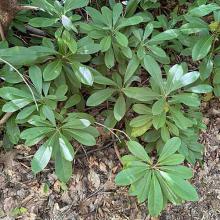Rhododendron maximum
Common name:
Rosebay rhododendron
Genus:
Rhododendron
Family:
Ericaceae
Order:
Ericales
Rhododendron maximum
Common name:
Rosebay rhododendron
Genus:
Rhododendron
Family:
Ericaceae
Order:
Ericales
Rhododendron maximum
Common name:
Rosebay rhododendron
Genus:
Rhododendron
Family:
Ericaceae
Order:
Ericales
Genus (Plantae): Rhododendron
Rhododendron /ˌroʊdəˈdɛndrən/ (from Ancient Greek ῥόδον rhódon "rose" and δένδρον déndron "tree") is a genus of 1,024 species of woody plants in the heath family (Ericaceae), either evergreen or deciduous, and found mainly in Asia, although it is also widespread throughout the lowland and montane forests of the Pacific Northwest, California, and the highlands of the Appalachian Mountains of North America. It is the national flower of Nepal, as well as, the state flower of Washington and West Virginia in United States, the provincial flower of Jiangxi in China and the state tree of Sikkim and Uttarakhand in India. Most species have brightly colored flowers which bloom from late winter through to early summer.
Azaleas make up two subgenera of Rhododendron. They are distinguished from "true" rhododendrons by having only five anthers per flower.
Toxicology
Some species of rhododendron are poisonous to grazing animals because of a toxin called grayanotoxin in their pollen and nectar. People have been known to become ill from eating honey made by bees feeding on rhododendron and azalea flowers. Xenophon described the odd behavior of Greek soldiers after having consumed honey in a village surrounded by Rhododendron ponticum during the march of the Ten Thousand in 401 BCE. Pompey's soldiers reportedly suffered lethal casualties following the consumption of honey made from Rhododendron deliberately left behind by Pontic forces in 67 BCE during the Third Mithridatic War. Later, it was recognized that honey resulting from these plants has a slightly hallucinogenic and laxative effect. The suspect rhododendrons are Rhododendron ponticum and Rhododendron luteum (formerly Azalea pontica), both found in northern Asia Minor. Eleven similar cases have been documented in Istanbul, Turkey during the 1980s. Rhododendron is extremely toxic to horses, with some animals dying within a few hours of ingesting the plant, although most horses tend to avoid it if they have access to good forage. The effects of R. ponticum was mentioned in the 2009 film Sherlock Holmes as a proposed way to arrange a fake execution. It was also mentioned in the third episode of Season 2 of BBC's Sherlock, speculated to have been a part of Sherlock's fake death scheme.
Reference: Wikipedia

